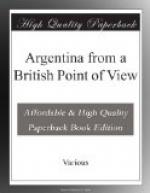In the second revolution of 1893 great excitement was caused in Rosario by a revolutionary gunboat being pursued by a Government boat and a naval battle (!) being fought on the river outside Rosario. These two boats blazed away at each other till the revolutionary gunboat was reduced to a wreck; the Government boat then threatened to turn its guns on Rosario unless the revolutionists capitulated. The town was given twenty-four hours to decide, and, after various disasters, including a terrible battle, had been threatened, as usual the revolution came to a sudden end, on this particular occasion owing to the revolutionist leader, D. Alem, committing suicide. That same year, 1893, distinguished itself by drawing to a close with three of the most terrible dust storms ever seen in a country that, after any lengthened period of dry weather, suffers from dust storms of a greater or lesser degree. The first of these occurred early in December, after many months of drought, on a brilliantly sunny afternoon. Standing at the front door of a house at Fisherton, a suburb about six miles from Rosario, we noticed right down in the S.W., on the horizon, great banks of grey-looking clouds, which, to our surprise, seemed to be rolling rapidly up the sky towards us. They had a most alarming appearance, for these masses of grey cloud approaching so rapidly seemed to portend a storm of terrible force. In less than twenty minutes from the time we first saw the clouds the afternoon had changed from brilliant sunshine to pitchy darkness. So rapidly had the darkness come on us that no one was prepared, and no matches or lights were forthcoming; so there we stood in a room in absolute darkness, no glimmer of light even revealing where the windows were situated in the room. Though all doors and windows were closely shut, we could feel the dust entering in clouds through the cracks, making it quite unpleasant breathing. When the storm caught us we had to stand and wait, I must own with some fear as to how it was going to end. Up to this time the storm had come up and fallen on us in total silence: now, after about ten minutes of pitch darkness, we could hear in the far distance the wind coming. It came up with cyclonic force, and then everything in the way of tins and buckets began to be blown in every direction, and the horses to gallop about neighing, evidently very much frightened. The wind was the forerunner of the rain, which gradually




